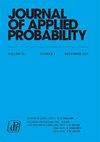基于广播的随机初始意见共识算法中的共识分布
IF 0.7
4区 数学
Q3 STATISTICS & PROBABILITY
引用次数: 0
摘要
对于代理的初始意见是随机变量的情况,我们研究了基于广播的一致性算法形成的一致性的分布。我们首先推导了代理人平均意见的时间演化的两个基本方程。使用导出的方程,我们研究了在代理不具有任何互信的极限下一致性的分布,并表明如果每个代理的初始意见是可积的,则代理之间不具有互信的一致性与统计性质上具有完全互信的一致形成鲜明对比。接下来,我们提供了必要的公式,以数学方式讨论代理数量趋于无穷大的极限中的一致性,并导出了几个结果,包括关于该极限中一致性的中心极限定理。最后,我们研究了当代理的初始意见遵循稳定分布时,一致性的分布,并表明在代理数量趋于无穷大的极限下,一致性也遵循稳定分布。本文章由计算机程序翻译,如有差异,请以英文原文为准。
Distribution of consensus in a broadcast-based consensus algorithm with random initial opinions
We study the distribution of the consensus formed by a broadcast-based consensus algorithm for cases in which the initial opinions of agents are random variables. We first derive two fundamental equations for the time evolution of the average opinion of agents. Using the derived equations, we then investigate the distribution of the consensus in the limit in which agents do not have any mutual trust, and show that the consensus without mutual trust among agents is in sharp contrast to the consensus with complete mutual trust in the statistical properties if the initial opinion of each agent is integrable. Next, we provide the formulation necessary to mathematically discuss the consensus in the limit in which the number of agents tends to infinity, and derive several results, including a central limit theorem concerning the consensus in this limit. Finally, we study the distribution of the consensus when the initial opinions of agents follow a stable distribution, and show that the consensus also follows a stable distribution in the limit in which the number of agents tends to infinity.
求助全文
通过发布文献求助,成功后即可免费获取论文全文。
去求助
来源期刊

Journal of Applied Probability
数学-统计学与概率论
CiteScore
1.50
自引率
10.00%
发文量
92
审稿时长
6-12 weeks
期刊介绍:
Journal of Applied Probability is the oldest journal devoted to the publication of research in the field of applied probability. It is an international journal published by the Applied Probability Trust, and it serves as a companion publication to the Advances in Applied Probability. Its wide audience includes leading researchers across the entire spectrum of applied probability, including biosciences applications, operations research, telecommunications, computer science, engineering, epidemiology, financial mathematics, the physical and social sciences, and any field where stochastic modeling is used.
A submission to Applied Probability represents a submission that may, at the Editor-in-Chief’s discretion, appear in either the Journal of Applied Probability or the Advances in Applied Probability. Typically, shorter papers appear in the Journal, with longer contributions appearing in the Advances.
 求助内容:
求助内容: 应助结果提醒方式:
应助结果提醒方式:


